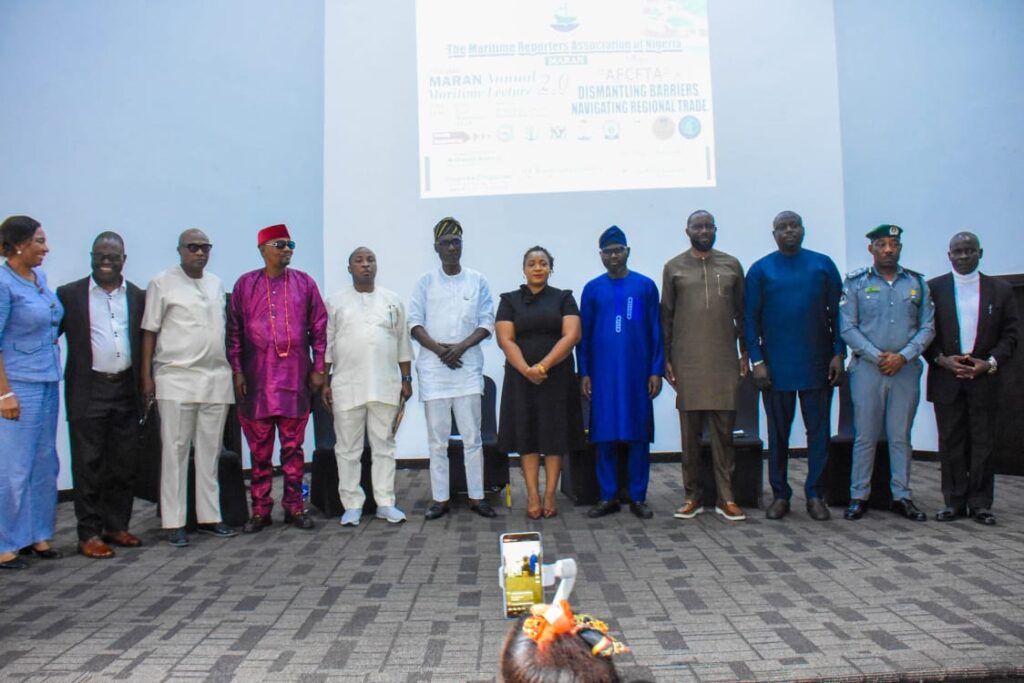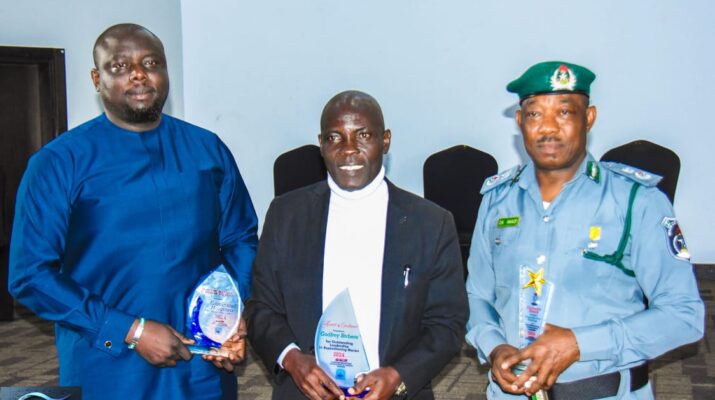The Maritime Reporters’ Association of Nigeria (MARAN) gathers industry opinion leaders to chart the course for the effective take-off of the Africa Continental Free Trade Area (AfCFTA), as well as proffer solution to its challenges
Recently, the Maritime Reporters’ Association of Nigeria (MARAN) assembled experts from the maritime sector in Lagos to discuss issues that relate to the African Continental Free Trade Area (AfCFTA). The event was the MARAN’s Annual Lecture and conference (MAMAL) 2024.
This year’s event came with the title “Dismantling Trade Barriers; Navigating Regional Trade”. Key note addresses were presented by the Nigerian Maritime Administration and Safety Agency (NIMASA), the Nigerian Exports Promotion Council, TANTITA Security Limited and other agencies in the sector, while heads of some agencies and seasoned heads of media organisations were Panelists who took time to dissect the papers and issues which arose in the course of the presentation.
The Minister of the Marine and Blue Economy, Adegboyega Oyetola was represented at the event by his Special Assistant on Media, Mr. Ismail Omipidan.
President of MARAN, Godfrey Bivbere in his welcome address expressed his gratitude to dignitaries who graced the occasion.
Speaking at the event, a maritime consultant and former deputy national President of the Association of Nigeria Licenced Customs Agents (ANLCA), Dr. Kayode Farinto stressed the need for all hands to be on deck to work towards ensuring that all trade barriers inhibiting trade progress and development in Africa continent, are eliminated or at least reduced to the barest minimum in the AfCFTA regime.
According to Farinto, working at eliminating the noticed barriers, would boost intra Africa trade, particularly those in value added productions and trade across all sectors of Africa’s economy.
Farinto added that bringing all the fifty five countries to the African Union, and the eight regional economic communities to create a single market for the continent is a welcome development for the continent while the enablement of free flow of goods and services across the continent would boost trade in Africa.
Farinto noted that one of the challenges that pose an impediment to AfCFTA is Nigerians propensity to conceal vital information thus pretending that all is well even when the truth is obvious.
The truth he explained centered on the controversy surrounding the first shipment under AfCFTA, hence stressing calling for a change of attitude of concealing facts which often lead to distortion and confusion in the system.
According to Farinto, if AfCFTA must succeed, it behoves the Nigeria Customs Service to play a pivotal role in ensuring that trade facilitation is enhanced even when there is a pressure on the areas of revenue generation.

Farinto criticised the multiple levies and fees imposed by regulatory agencies on export items describing them as detrimental to trade.
He said each Federal Government regulatory agency imposes its fines, levies, or fees, which collectively stifle trade.
“For example, regulated items handled by agencies like SON or NAFDAC incur multiple charges, including import permits, MANCAP fees, inspection costs, and labelling fees,” he said, adding that these practices are unsustainable.”
In his address, a maritime lawyer and the Chief Executive Officer of ZOE Maritime Limited, Barrister Edodo Temisan Emoren, who commended MARAN for the Conference, noted that AfCFTA is a very important instrument for Africa Continent which would help in economic growth of the continent.
She however called on the Customs Service to up its game by harmonising its operations and also called for the harmonisation of the relevant laws of the African Continent towards fighting against criminality.
To achieve this, Mrs Emoren said both commercial and criminal laws of the continent must be implemented to the letter so as to check piracy and other crimes in the region.
She therefore urged the other African countries to emulate Nigeria’s progress with the SPOMO, the Special Anti Piracy act, as sponsored by NIMASA.
The CEO of Le Look Bags, Mrs Chinwe Ezenwa, told the audience that inadequate logistics and infrastructure could hinder Nigeria’s ability to fully capitalise on AfCFTA.
She highlighted the operational Lekki Deep Seaport and ongoing projects in Bakassi and Badagry as promising developments but urged stakeholders to position these facilities as transshipment hubs.
Ezenwa said Nigerian ports must compete with ports like Tema and Lomé in terms of infrastructure, operational efficiency, and ease of doing business for AfCFTA.
The representative of Oyetola said that the Minister was worried by insinuations from various quarters that his ministry was inactive. He said, “If there are specifics that the Ministry should address, come up with them and I can assure you that they will be looked into. I think it is misleading and unfair on the Ministry to say it is doing nothing or underperforming, yet the same stakeholders turn around to commend agencies like NIMASA, NPA, Shippers’ Council, and others for their performance.”




